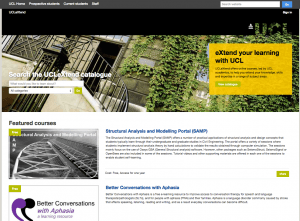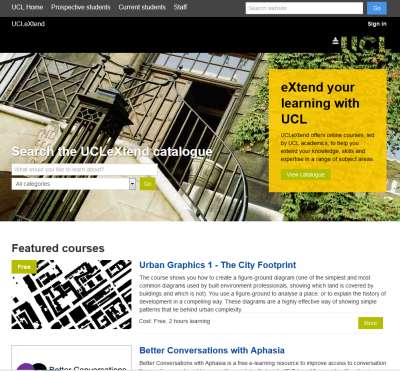UCLeXtend update – November 2014
By Matt Jenner, on 24 November 2014
UCL’s new public-facing e-learning environment; UCLeXtend is ready and waiting for your ideas. Live since May 2013 it has attracted over 5000 learners and 23 courses. We revamped it in August 2014 and now it’s sitting pretty. But there’s a lot more to come, this is where you get involved.
Note: this post is largely written for an internal audience, apologies to external readers – do contact us (details below) if you have an enquiry.
About UCLeXtend
For those who don’t already know, it’s a Moodle-based online platform which can cater for a wide range of courses. Its core capability is to advertise courses, attract/process registrations and provide an online space for learning and teaching. Do take a look for yourself – http://extend.ucl.ac.uk
It can be used to support a range of ideas and activities and so far has been used for:
- CPD
- Executive education
- Conferences
- Taster modules
- Research dissemination
- Mini-MOOCs
- Self-paced study.
Some are free, others charge; some are open, others are closed/private. A few are fully online, and the majority support face to face activities. Around half are brand new – but others have been running for some time in other guises. Some are not even courses at all, and that’s OK too.
In brief; UCLeXtend is/offers:
- Moodle based – get on the ground running;
- Open registration – you do not need a UCL computer account to be a UCLeXtend learner / delegate / participant / etc. Anyone can register with their own email / password combination.
- Payment processor – not everything in life is free, so UCLeXtend accepts most credit and debit cards (or the slower, pay-by-invoice option)
- Free course provider – some things in life are free, you don’t have to charge for your course
- Discounts and ‘bulk seats’ options – more information in the UCLeXtend 101 wiki
Note: income derived from your UCLeXtend course goes directly to your department finance codes.
Get involved & find out more
Online guidance
There’s a few more things to cover; but much of it is procedural or too bloaty for email. So instead; we’ve compiled online content that outlines a lot of the questions you may have, processes, a handful of forms and a few other things. Do take a look, it should cover a lot (but it’s still in development):
https://wiki.ucl.ac.uk/display/UCLeXtend
(UCL login required – top left of the wiki, sorry external folk)
UCLeXtend drop-in session
If you’re interested in exploring UCLeXtend or have questions you want to ask please do get in touch. We’re also running a trial (one-off for now) session where you can come and ask questions, share your ideas and hear about what do next. We’ll do a demo of UCLeXtend and be on hand to talk with you. Feel free to come for the whole hour, or drop-in whenever you like.
Details
2nd December 2014, 13:00 to 14:00 in Foster Court 233
If you can’t attend this we will look to put on more dates in the future (January onwards) or would rather do it via an online meeting or for us to come along to a departmental / faculty / teaching group session then just ask.
Getting started? Why not try a ‘CPD Wrapper’
With so many options opening up; we felt it important to highlight one which is slightly easier to grasp and works well with existing provision. The concept is CPD Wrappers which we covered at the last Forum event in November. Here’s a presentation we made in E-Learning Environments which broadly outlines the ideas:
Full URL: https://www.haikudeck.com/cpd-wrappers-uncategorized-presentation-AmK4CAMI4E
If you’re interested in developing a ‘CPD wrapper’ (or anything else for UCLeXtend) get in touch with us, email is best – extend@ucl.ac.uk
Contact us
I don’t mind you contacting me directly, but you may find a faster (and more organised) response from the email above which goes to a shared inbox. Or come along to the session next Tuesday and we’ll go from there.
Hope to hear of your ideas soon!
 Close
Close





